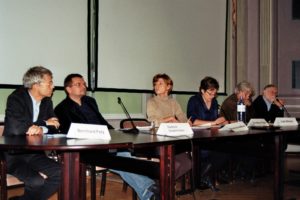Austrian Academy of Sciences 21 – 23 Oct. 2009
viennAvant und the Institut für Kulturwissenschaften und Theatergeschichte der Österreichischen Akademie der Wissenschaften [Institute for Culture Studies and History of Theatre of the Austrian Academy of Sciences] organised an international symposium on 21 – 23 October 2009 with the aim of initiating a cross-disciplinary analysis of the Viennese avant-gardes between 1945 and 1975 and a discussion on crucial topical issues concerning art, culture, media and society.
Lecturers and panel members were Dieter Bogner, Brigitte Borchhardt-Birbaumer, Evelyn Deutsch-Schreiner, Diedrich Diederichsen, Thomas Eder, Daniel Ender, Andreas Felber, Gabriele Jutz, Rudolf Kohoutek, Elke Krasny, Verena Krieger, Siegfried Mattl, Manfred Müller, Walter Rohn, August Ruhs, Thomas Schäfer, Johanna Schwanberg, Bernhard Steger und Irene Suchy. The symposium was moderated by Renata Schmidtkunz.
The three-day symposium was addressed to a lacuna in academic research: the specifically Viennese avant-gardes of the time between 1945 and 1975 have only received patchy attention so far. What is lacking are multidisciplinary analyses of the artistic, theoretical and strategic position of these Viennese avant-gardes, who themselves refused to be hemmed in by the boundaries between the different genres.
Within 20th century modernity the avant-garde movements form on the one hand a point of vantage and a pool of innovation situated within the territory of art and, on the other, an entity aiming critically to transcend art as a system of functions. These movements are also deeply paradoxical in that their radical and utopian demands in no way preclude their institutionalisation in terms of the politics of culture and the musealisation of those of its products that meet the criteria formulated by the art market and the media. In this way they offer a field of research of outstanding interest as far as converging and diverging concepts and theories are concerned.
The Symposium sought to achieve a twofold aim:
° Positioning these Viennese avant-gardes vis-à-vis the classic avant-gardes, highlighting their time-delayed appearance, influences and relationships and offering an analysis of the rationale underpinning the Austrian variant of this phenomenon before the background of current international debates on the avant-garde concept.
° Reconstructing the historical, local and socio-cultural context of Vienna as a focus of creative energy and fleshing out the conditions of innovation and creativity and the relationship between “localness” and “internationality” in the context of the tightly-woven local and personal networks.
At the same time the question was raised how relevant these specific avant-gardes are from today’s point of view. It remains a fact that the Viennese avant-gardes played a pervasive role in advancing and putting into practice a far-reaching socio-political agenda in terms of representation and the self-organisation of (counter-) public spheres. Through their manifestations they bridged the gap between art and theoretical work, body art, the use of new media and feminist artistic practices, opened up art as a system and put it into perspective to a degree that had been unconceivable until then and in fact constituted rites of passage from the bourgeois artwork to new media, technologies, communications, services and the formation of networks.
To safeguard a cross-disciplinary approach, the symposium was organised as a series of trans-disciplinary thematic areas:
● Wiener Grund [Viennese scenarios]
● Grenzüberschreitungen [Transgressions]
● Körper und Medium [Body and media]
● Arbeit an der Form [Elaborating form]
● Politik der Avantgarden [The politics of the avant-gardes]
A panel discussion on the topic “Erbe und Verrat” [Legacy and treason] rounded off the symposium.
The whole symposium was moderated bei Renata Schmidtkunz
Overall planning was in the hands of a viennAvant project team consisting of Andreas Fraunberger, Elisabeth Großegger, Angela Heide, Waltraud Heindl, Rudi Kohoutek, Helga Köcher, Manfred Müller, Gerald Resch, Johanna Schwanberg und Stefan Schmidl.
The symposium was complemented by a panel discussion conceived by Hubert Christian Ehalt in the series “Wiener Vorlesungen” entitled Avantgarde – Epoche, Prinzip, Aktualität? with Helga Köcher, Michael Rohrwasser, Stella Rollig and Manfred Wagner at the Wappensaal of Wiener Rathaus.
The Cultural Office of the City of Vienna and the Federal Ministry of Science and Research provided funding for the Symposium.



